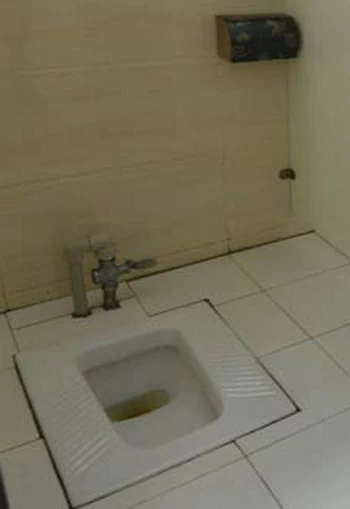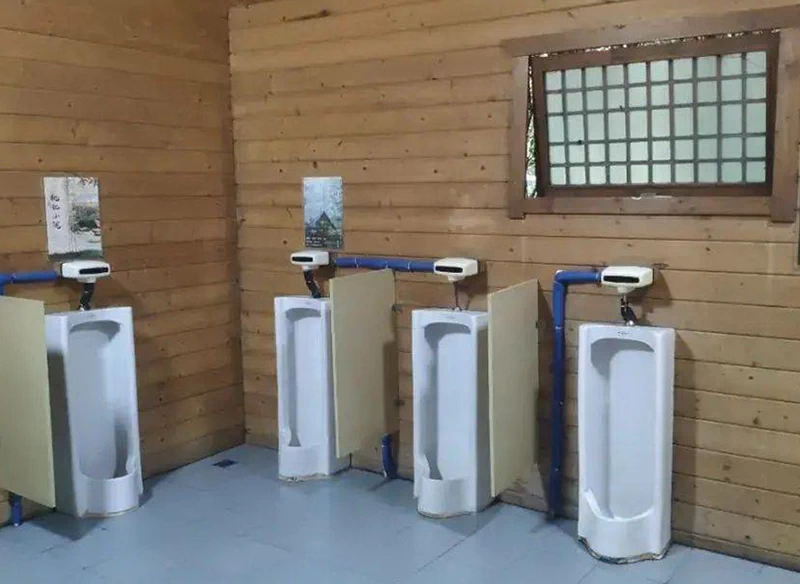Visiting a new country is always an exciting experience, but it can also come with its challenges. One common concern for foreign tourists visiting China is navigating public toilets. Chinese public restrooms can be quite different from what travelers are used to in their home countries. This guide aims to provide helpful tips and insights on How to use public toilets in China, ensuring a comfortable and stress-free experience.
Understanding the Types of Toilets in China
First, let’s discuss the types of toilets you might encounter in China. One of the most common type public toilets in China is the squat toilet. Unlike the Western-style sit-down toilets, squat toilets require users to squat over a ceramic bowl embedded in the ground. This might be a new experience for many foreigners, but it is considered more hygienic since there is no direct contact with the seat.
However, you can also find Western toilets in many places, especially in international hotels, modern shopping malls, and airports. These toilets are similar to what you might find in Western countries. It’s good to know that in high-traffic tourist areas, you’re likely to encounter both types, giving you a choice depending on your comfort level.
How to Use Squat Toilets in China

Using a squat toilet may seem daunting at first, but it’s quite simple once you get the hang of it. Here’s a step-by-step guide:
- Positioning: Stand over the toilet, with your feet on either side of the bowl. The grooves on the sides are usually where you should place your feet.
- Squatting: Lower yourself into a squat position. Keep your balance by leaning forward slightly and using your arms if needed.
- Hygiene: Most Chinese public restrooms do not provide toilet paper. Therefore, it’s crucial to carry your own. After use, dispose of the toilet paper in the trash bin provided, as many toilets cannot handle paper waste.
Tips for Using Squat Toilets
Firstly, wear comfortable clothing that can be easily adjusted. Additionally, practice your squatting technique beforehand, especially if you’re not used to it. It’s also wise to carry a small bottle of hand sanitizer, as soap might not always be available.
Finding Public Toilets in China
When exploring China, you may wonder where to find public restrooms. In urban areas, public toilets are quite common and can be found in parks, tourist spots, shopping malls, and train stations. Look for signs that say “公共厕所” (gōnggòng cèsuǒ) or simply “厕所” (cèsuǒ). These signs usually indicate the location of a public toilet.
Additionally, many restaurants and cafes have restrooms. However, it is polite to make a purchase if you plan to use their facilities. Furthermore, modern shopping malls and large supermarkets typically offer clean and well-maintained restrooms.
Toilet Paper and Hygiene Considerations
One key difference in China’s bathroom etiquette is the handling of toilet paper. In many public toilets in China, toilet paper is not provided in individual stalls. Instead, there might be a common roll near the entrance. It is a good practice to carry a small pack of tissues or toilet paper with you at all times.
Hygiene is another important consideration. While some restrooms have soap dispensers, they may not always be filled. Thus, carrying hand sanitizer is highly recommended. Moreover, some public restrooms use a foot pedal to flush, which can be a bit tricky to find if you’re not familiar with it.
Navigating Cultural Differences in Chinese Bathrooms
Cultural differences can also play a role in your bathroom experience in China. For example, you may notice that some public restrooms do not have doors or have only partial privacy. This can be surprising to foreigners, but it is fairly common in China.
Another cultural aspect to consider is the public restroom etiquette. It is generally polite to queue for restrooms and avoid making a mess. If you encounter a restroom attendant, it’s customary to offer a small tip if they’ve provided extra services, such as handing out toilet paper or keeping the area clean.
Essential Items to Carry for Public Toilets in China
To ensure a smooth experience in how to use public toilets in China, it is helpful to carry a few essential items. First and foremost, always have a pack of tissues or toilet paper.
Second, a small bottle of hand sanitizer can be a lifesaver. Third, consider bringing a small packet of wet wipes for extra cleanliness. Lastly, a plastic bag can be useful for disposing of used tissues if no trash bin is available.
Tips for Foreigners Using Toilets in China
For foreigners, using public toilets in China can be a unique experience. Here are a few additional tips to keep in mind:
- Practice squatting: If you’re not used to squat toilets, practice at home to build up your leg strength and balance.
- Be prepared: Always have tissues, hand sanitizer, and wet wipes on hand.
- Stay calm: Public restrooms in China can be busy, especially in tourist areas. Be patient and wait your turn.
- Respect privacy: While privacy may be limited in some restrooms, respect others’ space and wait for your turn.
- Adaptability: Be flexible and open-minded. Experiencing different cultures includes adapting to new situations.
Navigating on how to use public toilets in China might seem daunting for first-time visitors, but with the right knowledge and preparation, it can be a straightforward experience. Understanding the differences between Western and Chinese toilets, knowing how to use squat toilets, and being prepared with essential items can make all the difference.
By following these tips, you can ensure a comfortable and stress-free experience while exploring the rich culture and beauty of China. Remember, every new experience is a chance to learn and grow, so embrace the adventure with an open heart and mind. Check out China Survival Guide for more tips.
More China Survival Guide
Prepare for smooth travels with the China Survival Guide, your go-to resource for practical advice on navigating daily life in China. From essential language tips and transportation know-how to safety guidelines and local etiquette.



